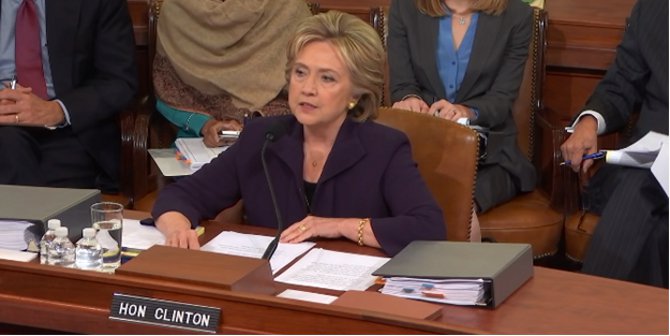 Last Thursday, presidential candidate and former Secretary of State, Hillary Clinton, gave testimony at a hearing of the House Select Committee on Benghazi, in an appearance which many commentators have characterized as a triumph for Clinton and a catastrophe for the Republican Party. Richard Brodsky writes that while the Benghazi tragedy was appropriate for a hearing, the House GOP broke long standing rules governing such legislative hearings, which meant they were able to make little political headway against the former Secretary of State.
Last Thursday, presidential candidate and former Secretary of State, Hillary Clinton, gave testimony at a hearing of the House Select Committee on Benghazi, in an appearance which many commentators have characterized as a triumph for Clinton and a catastrophe for the Republican Party. Richard Brodsky writes that while the Benghazi tragedy was appropriate for a hearing, the House GOP broke long standing rules governing such legislative hearings, which meant they were able to make little political headway against the former Secretary of State.
American democracy depends on the ability of legislative bodies to investigate and check abuse by the executive. Unlike parliamentary systems, the government is regularly summoned and questioned under oath. During my time as a Member of the New York State Assembly I issued dozens of legislative subpoenas, conducted dozens of legislative hearings under oath. We were able to reveal truths and move legislation. There are effective ways to do this. But it requires discipline and a decent respect for the Constitutional limits of such investigations. The Benghazi hearings, especially the Hillary Clinton testimony Thursday, were ineffective because they ignored basic rules.
There is no more important use of legislative power than requiring executive branch officials to publicly account for their actions. It is at the heart of the American system of checks and balances. It is part of American folklore, and things like the Watergate hearings resonate with the American people. So do the McCarthy hearings.
The Benghazi tragedy was appropriate for a hearing. Why were we there? What was the mission? Were things mishandled by the Executive Branch? We need hearings on such topics. So what went wrong at Hillary’s appearance at last Thursday’s Congressional Benghazi hearings? The Republicans broke obvious and long-standing rules governing legislative hearings.

Credit: The Select Committee on Benghazi
Rule 1 – State the purpose of the hearing and stick to it. Meandering around and excursions into interesting but off-topic subjects doesn’t work. The initial subject matter was how four American diplomats lost their lives. As it proceeded, it morphed into why we were in Libya, and Hillary’s email problem. Sidney Blumenthal’s emails? Really? Interesting, but not part of the original mandate. This made a “fishing-expedition” counter attack by Hillary easy and persuasive.
Rule 2 – Don’t Oversell The Evidence. The hearing process will eventually make the evidence clear. As soon as Congressman Issa, and others, made erroneous assertions of Hillary’s personal responsibility for the inadequate security at Benghazi, it undercut everything that happened later. When Congressman Pompeo did the same on Meet The Press, the damage was irreversible.
Rule 3 – Avoid Partisanship. The public expects that partisan and ideological differences will be part of any legislative activity. But there are limits. The Republican leadership let the partisan objective overwhelm the institutional interests. It was so bad that Republicans themselves admitted it, both Majority Leader McCarthy and Congressman Hanna. The net result is poll data showing that only 23 percent of Americans trust the hearing process.
Rule 4 – Ask Questions, Don’t Make Speeches, Don’t Badger, And Don’t Interrupt. There were effective questioners at Thursday’s hearing. Congresswoman Roby was able to focus on relevant State Department errors; Congressman Pompeo knew the record, and how to use it to support his conclusions. Others, Dems and Reps, were disorganized and talked past the witnesses.
Perhaps most importantly, television defines winners and losers. Absent smoking gun documents or blockbuster admissions, Hillary’s personal communication skills defined the impact of the hearing process. If folks were watching who are not committed Hillary lovers or haters, she did well, and will politically benefit from her hearing appearance.
In a sense, this was a missed opportunity. Benghazi was a failure by government to understand and take action, and by any fair measure Hillary bears responsibility for that failure, as part of her record as Secretary of State. The Republican inability to explore that failure, or to make personal political headway against Hillary, is the consequence of tone-deaf, hyper-personal, overheated violations of the basic rules of conduct for legislative hearings.
A version of this article first appeared at the Huffington Post.
Please read our comments policy before commenting.
Note: This article gives the views of the author, and not the position of USApp– American Politics and Policy, nor of the London School of Economics.
Shortened URL for this post: http://bit.ly/1ORUR8y
______________________
 Richard Brodsky – Demos & NYU Wagner
Richard Brodsky – Demos & NYU Wagner
Richard Brodsky served 14 terms as a New York State Assemblyman, retiring in 2010. He is currently a Senior Fellow at Demos, a progressive think tank in New York City, and a Senior Fellow at New York University’s Wagner School of Public Administration. His years of public service focused on government reform, environmental protection and economic policy. He is also a lawyer and a journalist. Follow Richard Brodsky on Twitter:www.twitter.com/richardbrodsky.






